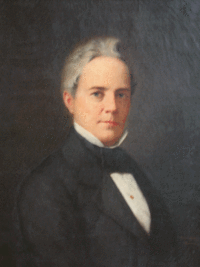Henry Boyce
| Henry Boyce | |
|---|---|

Portrait of Boyce (circa 1860)
|
|
| Judge on the United States District Court for the Western District of Louisiana | |
|
In office August 2, 1850 – February 19, 1861 |
|
| Nominated by | Zachary Taylor |
| Preceded by | New seat |
| Personal details | |
| Born | 1797 Derry, Ireland |
| Died | March 1, 1873 Boyce, Louisiana |
| Spouse(s) | Irene Archinard Octavia Delaney Mullanphy |
Henry Boyce (1797 – March 1, 1873) was a United States federal judge.
Born in Derry, Ireland, Boyce read law to enter the bar in 1820. He began a private practice in Bayou Leche, Louisiana by 1824, and was then in Alexandria, Louisiana from 1824 to 1828. He was a planter in Rapides Parish, Louisiana from 1828, maintaining that occupation until his death in 1873. He was a judge on the State Circuit Court of Louisiana from 1834 to 1839. He was the United States Attorney for the Western District of Louisiana in 1849.
On May 9, 1849, Boyce received a recess appointment from Zachary Taylor to a new seat on the United States District Court for the Western District of Louisiana created by 9 Stat. 401. Formally nominated on December 21, 1849, Boyce was confirmed by the United States Senate on August 2, 1850, and received his commission the same day. Boyce's served in that capacity until his resignation from the bench on February 19, 1861.
He was a member of the Louisiana State Legislature in 1865, and the legislature elected him to United States Senate from Louisiana. However, the U.S. Senate refused to seat Boyce.
Boyce was among the survivors of the steamboat Lioness explosion that occurred on the Red River south of on May 19, 1833. He married Irene Archinard with whom he had two children, Henry Archinard Boyce and Louise Frances Boyce. Irene died when she was 22 years old. Boyce subsequently married Octavia Delaney Mullanphy of St. Louis, with whom he had one child Mary Boyce. Powhatan Henry Clarke, West Point graduate and Medal of Honor recipient, is his grandson.
The town of Boyce, Louisiana, adjacent to his plantation Ulster, was named for him. He died at his plantation in Boyce, Louisiana.
...
Wikipedia
